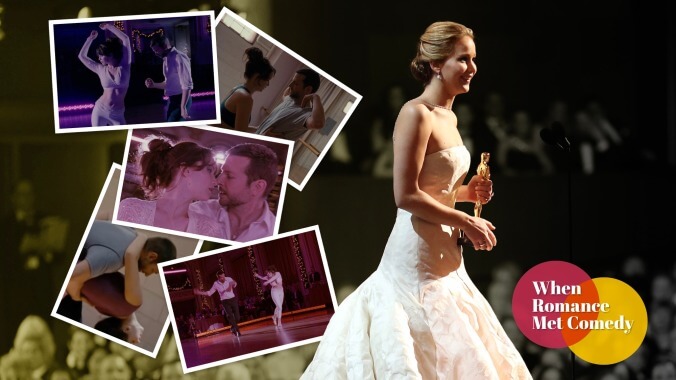The Oscars love a romantic comedy that’s not like other romantic comedies
Image: Graphic: Rebecca FassolaPhoto: Christopher Polk/Getty Images
Like an “opposites attract” couple, the Oscars and romantic comedies have had a curious relationship over the years. Julia Roberts (in Pretty Woman) and Renée Zellweger (in Bridget Jones’s Diary) are among the actors who’ve earned performance nods for their rom-com work, and the genre has been represented in the screenplay category, too, with nominations for Sleepless In Seattle and My Big Fat Greek Wedding, among others. But it tends to be a certain type of dramatic, offbeat romantic comedy that catches the Academy’s attention in a major way. More Jerry Maguire (which earned five nominations), less When Harry Met Sally (which earned one). In fact, when you look at the contemporary romantic comedies that have broken through at the Oscars in categories beyond just acting and screenplay—like As Good As It Gets, Broadcast News, and much of Woody Allen’s early oeuvre—they usually share a couple of qualities: an auteur director, a prickly male protagonist, a quirky world, and/or a deeply stressful situation.
So even though the rom-com was at its absolute nadir in 2012, it’s not that surprising that Silver Linings Playbook managed to enchant the Academy, racking up eight nominations, including the “Big Five” (Picture, Director, Actor, Actress, and Screenplay), and becoming the first film since 1981’s Reds to be nominated in all four acting categories. Silver Linings Playbook has all the qualities that the Oscars love in a love story. It’s got a prestigious director in David O. Russell, who’d emerged as an unexpected Oscar darling with his 2010 boxing drama The Fighter, which itself scored seven nominations and two wins. It’s got a prickly protagonist in unfiltered, bipolar ex-teacher Pat Solitano (Bradley Cooper). It’s got an eccentric world of working-class Philly dysfunction. And it’s got a deeply stressful portrayal of how mental illness affects a family. Toss in a subplot steeped in a real-life season of the Philadelphia Eagles football team, and the film really does feel like a spiritual sequel to Jerry Maguire, four-quadrant appeal and all.
The secret to Silver Linings Playbook is the stress. The most emotionally affecting moment in any romantic comedy is the part where something drives the two leads apart and all seems lost until one of them realizes they’ve been an idiot and rushes back to declare their love. Silver Linings Playbook bottles that feeling and stretches it across a full two hours. Not just in the central love story between high-strung Pat and depressive widow Tiffany Maxwell (Jennifer Lawrence), but in every aspect of its high-wire look at family and mental illness.
The film opens with Pat leaving an eight-month stint at a psychiatric hospital and moving back in with his gentle mom (Jacki Weaver) and his obsessively superstitious, football-loving father (Robert De Niro). Pat’s subsequent struggle to re-adjust to normal life is more comedic than you’d expect for a drama but more stressful than you’d expect for a feel-good comedy. Silver Linings Playbook leaves just enough room to make you wonder whether things actually will work out okay. So, as in The Fighter, when the film lands on a conventional endpoint, you’re tricked into thinking you’ve watched something deeper than you actually have.
I don’t totally mean that as an insult. There’s something captivatingly watchable about Silver Linings Playbook, even as the mechanics of its quirky romance are so baldly on display. But the film plays differently today, now that Russell’s high-volume style is no longer in vogue, Lawrence is no longer America’s uncouth sweetheart, and Cooper is no longer trying to prove he can do more than just be the villain in comedies. Silver Linings Playbook feels like a product from a different era, which of course it is, but in an “Oh my god, I can’t believe 2012 was almost a decade ago” kind of way.
At the time, most of the attention for the film’s performances centered on De Niro and Lawrence—the aging icon who buoyed himself from a late-career slump, and the young starlet who basically cemented her entire celebrity persona by tripping up the stairs while receiving her Oscar for the film. Silver Linings came out right on the heels of Lawrence’s explosive mainstream breakthrough in The Hunger Games, and kicked off a weird run of Russell casting the twentysomething as increasingly middle-aged women. (As Russell tried to argue at the time, “She kind of has an ageless quality about her, which is remarkable… she could be 20, she could be 40.”) Silver Linings at least lampshades the fact that Tiffany is awfully young to have been both married and widowed (Lawrence was only 21 when she made the movie), although it doesn’t really engage with the 16-year age gap between its two leads.
As in all of her collaborations with Russell, Lawrence gives a big performance in Silver Linings Playbook, but it works in the sense that she’s very locked into the specific kind of dark-comedy realism he’s aiming for. Tiffany’s aggressive overconfidence clearly masks deep vulnerabilities, and Lawrence embodies that dichotomy well. She’s brassy, funny, and a touch heartbreaking in a way that hides just how thinly her character is written. There’s a recurring bit where Tiffany yells at Pat while he’s out running, which is funny every time it happens. Plus Lawrence comes as close as any human being actually could to selling terrible lines like, “I was a big slut. But I’m not anymore. There’s always gonna be a part of me that’s sloppy and dirty, but I like that, along with all the other parts of myself. Can you say the same about yourself, fucker?”
